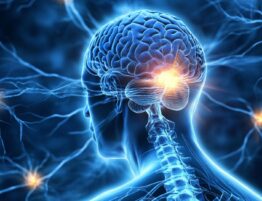Migraines are far more than just bad headaches. They’re severe neurological disorders that affect millions of people worldwide and can completely disrupt daily life. Symptoms go beyond head pain to include nausea, vomiting, and extreme sensitivity to light or sound. Understanding what causes migraines is essential for managing them effectively.
The brain plays a central role in triggering migraines. Neurological changes, such as abnormal brain activity, can trigger an attack. These changes affect blood vessels and nerve signals throughout the head and neck. Migraine causes and triggers vary widely from person to person. Genetics makes some people more susceptible to developing migraines. Brain chemical imbalances, particularly low serotonin levels, contribute to the condition.
External factors also play a major role in triggering attacks. Stress, hormonal changes, and certain foods commonly spark migraines. Environmental factors, such as bright lights, loud noises, or strong odors, can exacerbate symptoms. Neurologists study these triggers to develop better treatments. Early intervention can reduce both the severity and frequency of attacks. As research into brain function advances, new remedies continue to emerge. Understanding the neurological causes of migraines empowers patients to take control of their condition. It helps them identify triggers and seek effective care. Advances in neurology hold real promise for improved migraine management.
Migraine Causes and Triggers
Migraines are complex neurological disorders that cause intense headaches, nausea, and increased sensitivity to light and sound. Understanding what causes and triggers migraines helps manage attacks more effectively. Triggers vary significantly between individuals and include lifestyle, environmental, and neurological factors. Identifying your specific triggers allows for better prevention and treatment.
Neurological factors involve abnormal brain activity. A phenomenon called cortical spreading depression creates abnormal electrical waves in the brain that spark migraines. Imbalances in serotonin and other neurotransmitters disrupt normal nerve signals. Genetics increases susceptibility in some people, making them more prone to attacks. These neurological causes of migraines are responsible for the pain and other symptoms people experience.
Lifestyle factors play a significant role in triggering attacks. Stress and irregular sleep patterns frequently trigger migraines. Skipping meals or becoming dehydrated can exacerbate symptoms. Certain foods, such as caffeine, aged cheeses, or processed meats, act as triggers for many people. Hormonal changes, especially in women, often trigger migraine attacks.
Environmental factors also contribute to the development of migraines. Bright lights or loud noises can trigger attacks in individuals who are sensitive to them. Strong scents, such as perfumes or cleaning products, may trigger symptoms. Weather changes, particularly shifts in barometric pressure, are common culprits that many migraine sufferers are familiar with.
Common migraine causes and triggers:
- Neurological: Cortical spreading depression sparks attacks; abnormal neurotransmitter levels disrupt brain function; genetic factors increase risk.
- Lifestyle: Stress triggers neurological changes; poor sleep disrupts brain chemistry; specific foods cause reactions.
- Environmental: Bright lights overstimulate nerves, loud noises heighten sensitivity, and weather changes affect brain signals.
- Hormonal: Estrogen fluctuations trigger attacks; menstrual cycles often worsen symptoms; pregnancy may change frequency.
- Dietary: Caffeine or alcohol can spark reactions; dehydration amplifies pain; fasting disrupts brain stability.
Managing migraine causes and triggers involves making strategic lifestyle changes. Avoiding known triggers can significantly reduce the frequency of attacks. Neurologists may prescribe medications to stabilize brain activity and prevent migraines. Tracking your symptoms helps identify patterns you might otherwise miss. Stress management techniques, such as meditation, can lower your risk. Environmental adjustments, such as using dim lighting, can provide relief. Personalized care tailored to your specific triggers enhances outcomes.
Natural Remedies for Migraines
Migraines cause severe pain and discomfort that can last for hours or even days. Natural approaches can help reduce both frequency and intensity. These include herbs, lifestyle modifications, and holistic methods. Natural remedies for migraines complement medical treatments, empowering patients to manage symptoms more effectively.
Several herbs have shown promise in migraine management. Feverfew may reduce migraine frequency when taken regularly. Butterbur has shown effectiveness in some studies, though it requires medical supervision due to potential side effects. Ginger can ease nausea during migraine attacks and may help with pain.
Effective natural remedies for migraines:
- Herbs: Feverfew, butterbur, or ginger for symptom relief
- Sleep: A Consistent rest schedule prevents attacks
- Hydration: Drinking adequate water reduces triggers
- Stress relief: Yoga or meditation calms the brain
- Holistic therapies: Acupuncture or aromatherapy may ease pain
Diet plays a vital role in natural remedies for migraines. Avoiding trigger foods, such as caffeine, alcohol, and processed meats, helps many people. Eating magnesium-rich foods such as nuts, seeds, or leafy greens supports healthy brain function. Some people find that taking magnesium or riboflavin supplements helps reduce migraine frequency.
Always consult a doctor before starting any new remedies, especially herbs or supplements. Combining natural approaches with medical guidance offers the most effective migraine management. This integrated strategy can significantly enhance the quality of life for individuals with migraines.
Migraine Prevention Tips That Work
Migraines disrupt daily life with intense pain that can last for hours or days. Preventing them significantly improves quality of life. These actionable migraine prevention tips help reduce the frequency of migraine attacks. The strategies focus on lifestyle modifications, diet management, and stress reduction. Consistency is key to seeing results.
Maintain a regular sleep schedule by going to bed and waking up at the same time every day. Aim for seven to eight hours of quality sleep each night. Stay hydrated by drinking water consistently throughout the day. Eat balanced meals on time to avoid hunger-related triggers. Limit caffeine and alcohol consumption, as both can spark migraines in sensitive individuals.
Effective migraine prevention tips:
- Sleep: Stick to a consistent sleep routine every day
- Hydration: Drink plenty of water to prevent dehydration
- Diet: Avoid trigger foods and eat meals regularly
- Stress management: Use meditation or yoga for relaxation
- Exercise: Engage in moderate physical activity regularly
Protecting yourself from environmental triggers is essential. Simple habits, such as wearing sunglasses in bright light or using earplugs in loud environments, can make a real difference. These small adjustments help reduce the impact of external stressors on your nervous system.
Consulting a neurologist about preventive medications may offer additional relief, especially for people with frequent or severe episodes. Migraine prevention tips empower patients to take control of their health. Combining lifestyle changes with medical guidance effectively lowers migraine frequency and improves daily functioning.
Neurological Causes of Migraines
Migraines are complex neurological disorders involving abnormal brain activity and nerve dysfunction. These neurological causes of migraines trigger intense headaches, nausea, and sensory sensitivity. Understanding the underlying brain mechanisms helps improve both treatment and prevention strategies.
The brain’s cortex plays a crucial role in the development of migraines. Cortical spreading depression, a wave of altered electrical activity, disrupts normal brain function. This wave affects blood flow and activates pain pathways. Trigeminal nerve activation is another major factor in migraine pain. This nerve releases chemicals, such as calcitonin gene-related peptide (CGRP), which causes inflammation and intense pain.
Key neurological causes of migraines:
- Cortical activity: Spreading depression alters normal brain function
- Trigeminal nerve: Releases CGRP, causing inflammation and pain
- Blood vessels: Nerve-driven changes intensify throbbing headaches
- Serotonin: Low levels disrupt pain control mechanisms
- Genetics: Inherited traits increase migraine risk
Treatments target these specific mechanisms. Medications like triptans work by stabilizing serotonin levels and constricting blood vessels. CGRP inhibitors block the pain-causing chemical released by the trigeminal nerve. Lifestyle changes help reduce nerve overstimulation. Understanding these underlying causes helps both patients and doctors manage migraines more effectively with targeted approaches.
How to Treat Migraine Pain
Migraines cause severe pain that disrupts work, family life, and daily activities. Effective treatments target the neurological causes of migraines. How to treat migraine pain involves using medications, therapies, and neurology-guided options. These approaches work together to reduce pain and improve quality of life.
Medications are often the first line of treatment. Over-the-counter drugs like ibuprofen or naproxen help with mild to moderate cases. Triptans, such as sumatriptan, target serotonin receptors to prevent attacks. CGRP inhibitors like rimegepant block the pain-causing chemicals released during migraines. Preventive medications, such as beta-blockers or anticonvulsants, reduce the frequency of attacks. Neurologists prescribe treatments based on migraine severity and frequency. Always consult a doctor for proper dosing and to avoid medication overuse headaches.
Effective approaches for how to treat migraine pain:
- Acute medications: Triptans or CGRP inhibitors relieve active pain
- Preventive drugs: Beta-blockers or anticonvulsants reduce attack frequency
- CBT: Therapy manages stress-related triggers effectively
- Biofeedback: Helps control physiological responses
- Neuromodulation: Devices target abnormal nerve activity
Lifestyle changes, such as maintaining regular sleep patterns and staying hydrated, support medical treatments. How to treat migraine pain requires a personalized plan developed with your healthcare provider. Combining multiple treatment approaches provides the most effective relief for most people.
Long-Term Migraine Management Strategies
Successful migraine management requires understanding both triggers and treatment options. Migraine causes and triggers include neurological changes and lifestyle factors. Cortical spreading depression disrupts normal brain function. Low serotonin levels trigger pain pathways. Stress, poor sleep, or certain foods spark attacks. Bright lights or hormonal shifts worsen symptoms. Long-term management focuses on reducing these triggers for lasting relief.
Essential long-term management strategies:
- Sleep: A Regular rest schedule prevents attacks
- Hydration: Adequate water intake reduces trigger risk
- Diet: Avoid trigger foods like chocolate and aged cheese
- Stress reduction: Yoga and meditation calm the nervous system
- Preventive medications: Prescribed drugs lower attack frequency
Regular visits to a neurologist ensure your treatment plan remains effective and up-to-date. Combining prevention strategies with acute treatment provides sustainable migraine relief. This comprehensive approach helps you maintain a better quality of life despite living with migraines.













I've given up... the stress her office staff has put me through is just not worth it. You can do so much better, please clean house, either change out your office staff, or find a way for them to be more efficient please. You have to do something. This is not how you want to run your practice. It leaves a very bad impression on your business.
Please, leave your review
Write a comment: